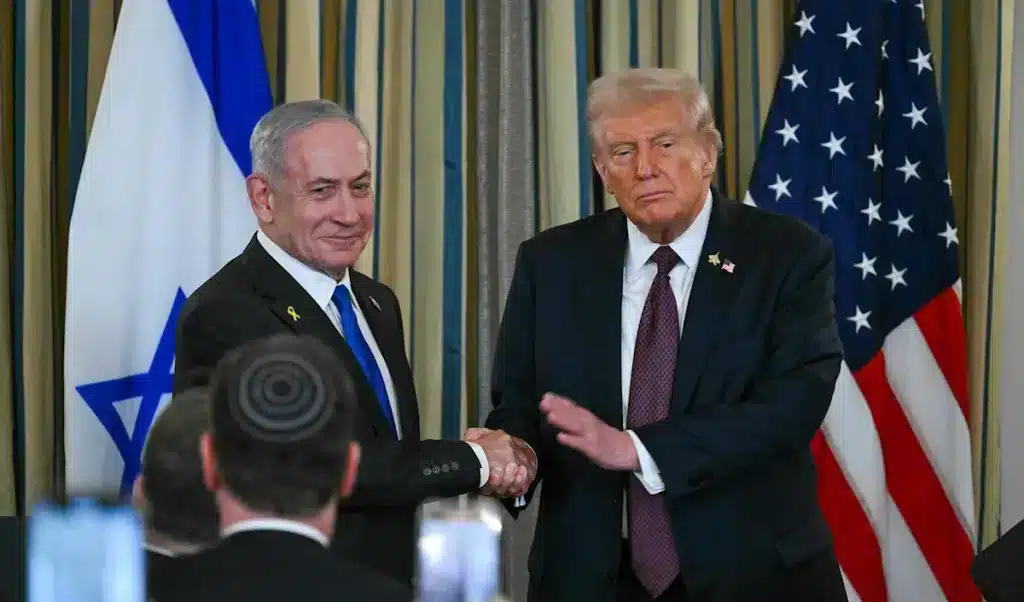
U.S. President Donald Trump and Israeli Prime Minister Benjamin Netanyahu at the White House. The two leaders met to announce an agreement on a U.S.-led peace plan to end the Israeli War. Photo: AFP.

Orinoco Tribune – News and opinion pieces about Venezuela and beyond
From Venezuela and made by Venezuelan Chavistas

U.S. President Donald Trump and Israeli Prime Minister Benjamin Netanyahu at the White House. The two leaders met to announce an agreement on a U.S.-led peace plan to end the Israeli War. Photo: AFP.
By Ibrahim Al-Amine – Oct 2, 2025
Donald Trump’s so-called “revolutionary” peace plan is less about ending the war than about cementing the logic shared by Washington and Israel under Trump and Benjamin Netanyahu: peace comes only through force. It is a diplomatic façade designed to repackage Israel’s objectives and give the US a stage-managed role as broker.
Trump’s meetings in New York with Arab and Islamic leaders were presented as heavy US pressure on Israel. In practice, they produced nothing more than symbolic nods. Trump got the cover he wanted, then shifted attention to his meeting with Netanyahu, framed as a decisive moment. Inside Israel, warnings against halting the war remained muted. The plan itself mirrors Israel’s goals, suggesting that some can be achieved without a full-scale military campaign. Washington and Tel Aviv focused on appearances, not substance.
The failed Israeli assassination attempt against Hamas leaders in Doha may have sped up Trump’s proposal, but it was coming regardless. Israel’s apology did not alter the core objective: removing political and military figures seen as obstacles to Hamas’s defeat. Having failed, Trump reassigned the task of forcing Hamas’s compliance to Turkey, Qatar, and Egypt. His message was blunt: Hamas has no choice but submission, and those who back the plan must enforce it.
Trump exploited the Qatar strike, not because he is inherently wedded to “liquidating” Hamas’s leadership, but because he saw, firsthand, the fear on the faces of those he met in New York: “Strike the weak so the strong lose heart.”
Details of the New York talks reveal how key states positioned themselves:
Saudi Arabia, intent on ending Hamas’s rule in Gaza and curbing its influence across Palestine, views the current task as not necessarily requiring a long international trusteeship. Its anxiety in Palestine mirrors its outlook in Lebanon and Syria: a bid to assert leadership by shaping political orders, something Riyadh believes it has achieved in Lebanon and is backing in Syria.
Egypt appears to have secured a US pledge against forced mass displacement, a promise not to force Egypt to absorb hundreds of thousands of Gazans. If the war pauses under international oversight, displacement simply returns as “voluntary” migration, with hundreds of thousands likely transiting Egypt to third countries. Cairo also wants al-Arish to be the hub for Gaza aid and reconstruction. Even this is uncertain: voices in Israel argue that Arab reconstruction funds should not all go elsewhere, and will use “security conditions” controlling every item entering Gaza to steer contracts and tenders their way inside the Strip.
Netanyahu Clarifies Zionist Position: The War Will Continue and Expand in the Region
Turkey focused on Palestinian statehood. Trump said the US “understands” the global tilt toward recognizing a Palestinian state, but he also “understands Israel’s fears.” His one trade-off: he would block formal Israeli annexation of the West Bank and Jordan Valley in exchange for shelving any operative move toward statehood. Netanyahu understood. Both sides agreed the current Palestinian Authority is unfit for any central role, back to the refrain of a “missing Palestinian partner.”
Trump’s post-meeting performance with Netanyahu mixed Hollywood flourishes with hard intent. There are no guarantees his plan will succeed, but one concrete outcome did emerge: agreement with Israel on a mechanism to force Palestinians into the plan, and to extend that compulsion to Arab and Islamic states that welcomed it. In this sense, Trump exploited the Qatar strike, not because he is inherently wedded to “liquidating” Hamas’s leadership, but because he saw, firsthand, the fear on the faces of those he met in New York: “Strike the weak so the strong lose heart.” Qatar is a small state that does not claim to spearhead confrontation; hitting it sends echoes toward other, more ambitious capitals.
Today, Palestinians are being offered capitulation after immense sacrifice. Even a prisoner exchange carries no fair balance. People in Gaza have no guarantee their families will return to their homes at all. Israel’s “withdrawal” blueprint contains no security guarantees against continued operations targeting anyone it labels a “partner in the October 7 (2023) attack” or any perceived threat. Israeli voices themselves now say that disarming Hamas cannot be guaranteed by promises, citing Lebanon as the example.
So what is the real objective? The one fact that must be treated with utmost seriousness is that US–Israeli alignment remains intact; analyses of deep rifts have little footing in reality. Washington knows that any genuine change would first require the ouster of Netanyahu’s government and the installation of a coalition ready to cut deals in and beyond Gaza. But that turn is not only up to Israel; it is up to the US. And under Trump, the American project is singular: subjugate everyone, friends and foes alike, to its program.
That is why what is happening now may be aimed not merely at blaming Hamas for obstructing the plan and justifying Israeli brutality in Gaza, but at widening the circle of accusation to excuse widening the wars, fully aligned with Netanyahu’s vow that the new Hebrew year must be the year of eliminating the “Iranian axis.” The eyes of America and Israel, and of their Western and Arab partners, are on Iran and on Iran’s allies in Yemen, Iraq, and Lebanon.
That is the crux. Are we now closer to another bout of madness?

Ibrahim Al-Amin is a Lebanese journalist, and the editor-in-chief of the Lebanese publication Al Akhbar.